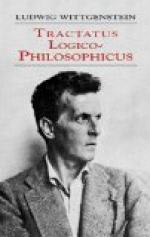5.542 It is clear, however, that ‘A believes that p’, ’A has the thought p’, and ‘A says p’ are of the form ‘"p” says p’: and this does not involve a correlation of a fact with an object, but rather the correlation of facts by means of the correlation of their objects.
5.5421 This shows too that there is no such thing as the soul—the subject, etc.—as it is conceived in the superficial psychology of the present day. Indeed a composite soul would no longer be a soul.
5.5422 The correct explanation of the form of the proposition, ’A makes the judgement p’, must show that it is impossible for a judgement to be a piece of nonsense. (Russell’s theory does not satisfy this requirement.)
5.5423 To perceive a complex means to perceive that its constituents are related to one another in such and such a way. This no doubt also explains why there are two possible ways of seeing the figure as a cube; and all similar phenomena. For we really see two different facts. (If I look in the first place at the corners marked a and only glance at the b’s, then the a’s appear to be in front, and vice versa).
5.55 We now have to answer a priori the question about all the possible forms of elementary propositions. Elementary propositions consist of names. Since, however, we are unable to give the number of names with different meanings, we are also unable to give the composition of elementary propositions.
5.551 Our fundamental principle is that whenever a question can be decided by logic at all it must be possible to decide it without more ado. (And if we get into a position where we have to look at the world for an answer to such a problem, that shows that we are on a completely wrong track.)
5.552 The ‘experience’ that we need in order to understand logic is not that something or other is the state of things, but that something is : that, however, is not an experience. Logic is prior to every experience— that something is so . It is prior to the question ‘How?’ not prior to the question ‘What?’
5.5521 And if this were not so, how could we apply logic? We might put it in this way: if there would be a logic even if there were no world, how then could there be a logic given that there is a world?
5.553 Russell said that there were simple relations between different numbers of things (individuals). But between what numbers? And how is this supposed to be decided?—By experience? (There is no pre-eminent number.)
5.554 It would be completely arbitrary to give any specific form.
5.5541 It is supposed to be possible to answer a priori the question whether I can get into a position in which I need the sign for a 27-termed relation in order to signify something.
5.5542 But is it really legitimate even to ask such a question? Can we set up a form of sign without knowing whether anything can correspond to it? Does it make sense to ask what there must be in order that something can be the case?




